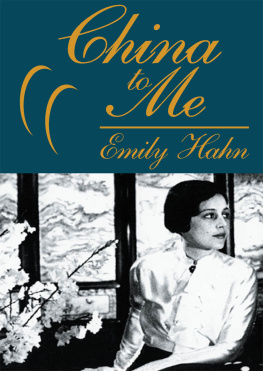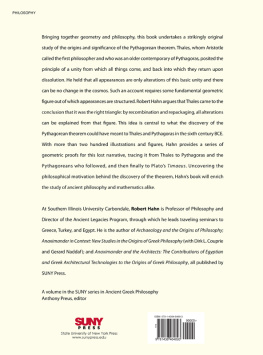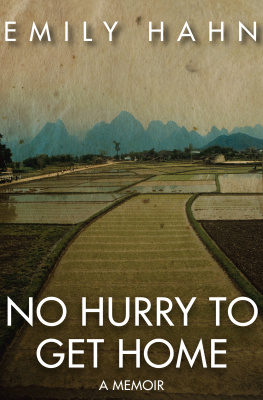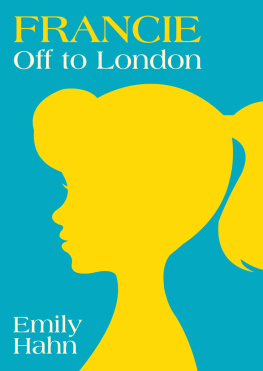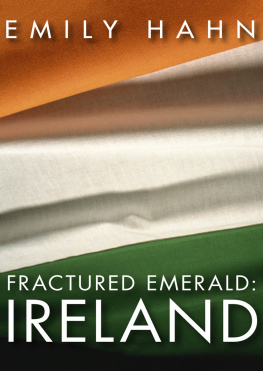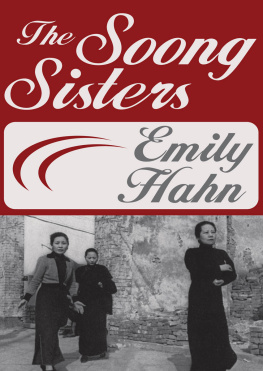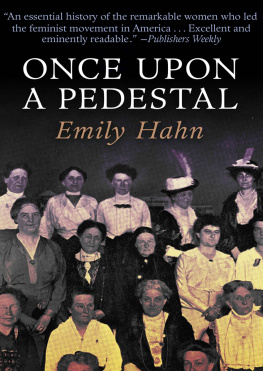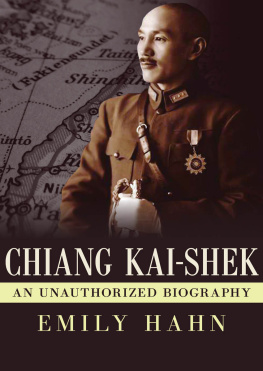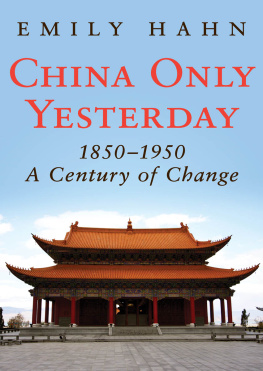England To Me
A Memoir
Emily Hahn

1. HOME: ENGLAND
It was August 2, 1946, when we arrived. The war was not so long over that we had shed every reminder of it, even in New York, and the Queen Mary was still fitted up as a troopship. Our cabin, the Majors and mine, had six horrible lumpy cots in it but only ourselves for the six of them, and Carola with Margrethe the nurse were in another chamber once palatial, now made shabby. All over the vast edificefor the Queen Mary never feels so much like a ship as like a fixed structure past which the ocean restlessly rollsa few people walked the decks, looking lost and nervous. And well they might, for the loud-speaker never let up for very long; it kept chivvying the men in uniform and telling them to go here, there, and elsewhere. The rest of us couldnt help straining our ears for our names every time. Aside from those luckless service people there were a few newspapermen, one early harbinger of spring in Paris in the person of a Baron Rothschild, and a surprisingly large array of British war brides now on their way home to Mother with the baby, having left their G.I. husbands to solitude and memories. The story usually was that the G.I. had promised a paradise of washing machines and plastic plumbing, but brought his wife home to a dreadful little shack out in Oklahoma or Georgia, without even so much as a cold-water tap.
We landed in the late afternoon, ten years after the Major last saw his native land and more than twelve years since I left Europe for the Orient. One is always inclined to grow reminiscent at such moments, and the Major had to drag himself from a deep silence to struggle with the mechanics of getting us home to Dorset. Between us we had collected a good deal of portable property during the past year: more than a ton, by accurate measure, of clothes and household goods.
Anything to declare? at last said a worried customs man.
Everything, said the Major. We were prisoners of war, and we outfitted again in New York. Every single article in those packing cases is new.
The customs man rubbed his chin and looked at the ton plus of luggage. Oh, thatll be all right, sir, he said.
We had missed the train, and after careful consultation decided to go home by taxi. Dusk was drawing in as we rode out through the suburbs of Southampton. Carola was drunk with excitement and weariness. I didnt know England would be like this, she said shrilly. I thought it would be nasty
Yet it didnt look too good. The driver showed us where the bombs aimed at the docks had fallen, and until we were out in the country it all looked dismayingly unfamiliar. The countryside, however, was its usual lush green self, and until dark closed in on us, in the New Forest, Carola talked without stopping. Then she curled up and went to sleep. Shortly after that it began to rain.
I sat in a corner seat, watching black nothingness outside and listening with wonder to the Major as we came nearer his village. Now, turn herea little farther along and youre in the main street now slow until you come to a gate
Ten years abroad had not caused him to forget all the turnings, I mused. Then I began to wonder what the house, Conygar, would be like. It may seem strange, but I hadnt even wondered until now. I had seen no photographs. The Major is bad at describing anything, unless he is first liberated by alcohol. He had only said, The place must be in frightful shapethe Armys had it six years. I had seen letters from some agent in Dorchester about getting it derequisitioneda wonderful wartime word, that. I had also exchanged a letter or two with Mrs. Clifton, wife of the caretaker.
Dont the Cliftons live in the house? I had asked.
No, said the Major, of course not. Theyre in the Cottage, just as if I knew what the Cottage was. If the house isnt ready, well have to live in the Cottage too, he added, but the Cliftons wont like that. Theyll be sure to have fixed up a room or two in the house for us to camp out in. Youre sure you wont get fed up with life in England, queueing for food and all that? After America?
After Hong Kong, I corrected him. After all! You cant tell me anything about queues.
That was all we had said about Conygar, except for an occasional deprecatory remark on the Majors part, aboard the Queen Mary. I dont quite know how I got the impression that it was going to be perfectly horrible, but I did. Maybe it was the way he assured me that at any rate we wouldnt have to stay long. Long enough to get it into shape and let it, he said, and then well be going off, I hope, on another job.
Therefore in unrationed America I had shopped with Hong Kong or Japan in mind, buying plenty of wash dresses and white shoes for Carola and myself, and the Major had invested in a few Palm Beach suits and things. We neednt worry about the clothes shortage in England, we told each other: we wont be there long enough.
I dont know what Carola expected. Children dont expect, I suppose; they either fear or anticipate with rapture, and Carola was not rapturous. One day on the Queen Mary she came in and sat on my lap and cried, and said, I want to have my birthday in New York. I want Geraldine to play with. I want to go home.
Poor Carola, I mused in the dark: always traveling, always losing homes and friends.
Slow up until you come to a gate, the Major was saying. Here it is. Now sharp, and straight along.
For a long time we drove, it seemed to me, after the gate. I saw trees on either side, and then a patch of thicker blackness where the taxi slowed up, but the Major said, No, thats the Cottage. Its pitch dark, Mickey; they must be up at the house. Carry on, sharp right.
The car rode over gravel that swished, and the headlights flashed on an array of glass surrounded by dark red brick. We came to a halt outside something that slowly took shapea porch sort of place. There was no light anywhere except our own. The Major got out.
Ill go down to the Cottage. Has someone a torch? Thanks. You wait here.
Margrethe and I climbed out, stretching our legs and staring curiously at the front of the house. Carola stayed asleep, sprawling at full length in our places. The second car with the luggage drove up behind us, and the two drivers stood with us in the drizzle, looking. A row of windows next to the porch was closed and dusty, and through them we looked into a bare room of plank flooring and stained walls.
Looks haunted, I said.
Just what I was about to remark, said one of the drivers. A big place it is. Id say the rooms run into two figures, wouldnt they, madam?
I wouldnt know, I said. Bushes grew up close on both sides, but one wing of the house could be seen stretching out into the dark.
We heard gravel crunching, and an excited, high-pitched voice, then the Major appeared, smiling for the first time that day. Two shorter people were with him.
Theyd gone to bed, said the Major.
Wed given you up, added one of the figures, the one with the womans voice. I made myself move forward.
Oh, Mrs. Clifton? We all shook hands. She was very small and a trifle bent, but her face was not lined, and she moved fast and lightly. Clifton, whose age I made no attempt to guess, was taking bags out of the car. The Major had suddenly become efficient and practical, as he does only when he thinks it necessary.
Thatll be all right, Clifton; you go in and unlock the door while the men unload. Mrs. Clifton, could you make a cup of tea for the drivers? Its a long way back. Thats right, now, then
A light went on inside a big heavy door; Clifton came out from the open hall.


